Real Life Stories
These are the real life stories of people with disability in Lesotho. Some names have been changed at the request of individuals. LNFOD has been given permission to use these stories to demonstrate the challenges and triumphs of people with disability in Lesotho.
If you wish to republish any of these stories, please contact the communications team
If you wish to republish any of these stories, please contact the communications team
Fighting for Education - Lipolelo Leshota
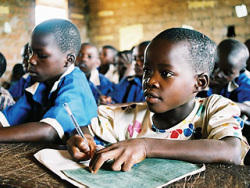
Lipolelo is a a partially sighted seven year old girl who lives in the district of Mohale’s Hoek. Lipolelo’s parents make their living selling traditional home brewed beer and rarely have the money to afford the bus fare to take her to the hospital.
Although a very bright and keen student, Lipolelo’s attempts to gain an education have been hampered by her inability to read or write, due to her impaired vision. Although she attends the local primary school, Lipolelo is not getting the education and attention she needs as her teachers lack the skills, resources and motivation to deal with a visually impaired student.
“She sits in class like a piece of baggage, accompanying the other children. She cannot read or write and hence has not managed to learn anything in school,” comments her mother.
Lipolelo’s parents are trying to enroll her in a school with the facilities and resources to break down her learning barriers but is as yet unclear when or if this might happen.
Although a very bright and keen student, Lipolelo’s attempts to gain an education have been hampered by her inability to read or write, due to her impaired vision. Although she attends the local primary school, Lipolelo is not getting the education and attention she needs as her teachers lack the skills, resources and motivation to deal with a visually impaired student.
“She sits in class like a piece of baggage, accompanying the other children. She cannot read or write and hence has not managed to learn anything in school,” comments her mother.
Lipolelo’s parents are trying to enroll her in a school with the facilities and resources to break down her learning barriers but is as yet unclear when or if this might happen.
The Deaf Seamstress - Maqaba Sehloho
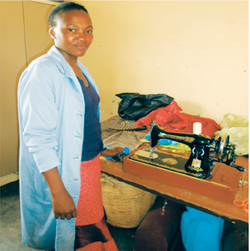
Maqaba Sehloho claims to be one of the happiest women in Maseru. Despite being born deaf the self-employed mother of two refused to let her disability define her.
Maqaba grew up in Maseru where she attended St Paul’s School for the Deaf. It was here that she met the man who would later become her husband. In 1998 Maqaba attended the Itjareng Vocational Centre for the disabled where she mastered the arts of knitting and sewing. Upon graduating she set about starting up her own sewing business in Khobetsoane using a sewing machine provided to her by Skill Share International. Through hard work and positive word of mouth her business grew and grew and Maqaba became one of the most sought after
seamstresses in the Bereadistrict. Her services are in such high demand that she now employs an able bodied assistant to help her keep up with the orders.
Maqaba is a member of the National Association of the Deaf in Lesotho (NADL) and a passionate believer that people with disability can achieve anything if provided the right support and resources.
Maqaba grew up in Maseru where she attended St Paul’s School for the Deaf. It was here that she met the man who would later become her husband. In 1998 Maqaba attended the Itjareng Vocational Centre for the disabled where she mastered the arts of knitting and sewing. Upon graduating she set about starting up her own sewing business in Khobetsoane using a sewing machine provided to her by Skill Share International. Through hard work and positive word of mouth her business grew and grew and Maqaba became one of the most sought after
seamstresses in the Bereadistrict. Her services are in such high demand that she now employs an able bodied assistant to help her keep up with the orders.
Maqaba is a member of the National Association of the Deaf in Lesotho (NADL) and a passionate believer that people with disability can achieve anything if provided the right support and resources.
The Blind Graduate - Sam Letima

Accessing education is only the first hurdle for people with a disability. Often those who have struggled against to odds to obtain a tertiary education find themselves at the mercy of Lesotho’s weakening economy. Youth unemployment is a big problem in Lesotho with estimates that over 30 percent of 15-24 year olds in the workforce are unemployed. The situation is even worse for young people with a disability as
most employers are reluctant to take on a disabled person when hundreds of other able bodied candidates are competing for the same position.
Sam Letima was born in the district of Thaba-tseka in the early 1980’s. He became visually impaired at the age of 8 and was subsequently sent to Maseru so that he might attend St. Bernadette primary, one of the few schools which accepts children with visual impairment. Rising against the odds Sam became the first visually impaired student to be admitted at Lesotho College of Education in 2005. In 2010 he obtained a Bachelors degree in education.
He has since been unable to obtain a paying job. Despite the fact that he lives hand to mouth, struggling to pay his rent each month, Sam is a vocal advocate for the human rights of people with disabilities and the Vice President of the Lesotho National League of Visually Impaired Persons (LNLVIP).
“People with a disability are not a burden to society. All we ask for is the opportunity to access education and employment on an equal basis so that we may play our part and contribute to the community,” comments Sam.
most employers are reluctant to take on a disabled person when hundreds of other able bodied candidates are competing for the same position.
Sam Letima was born in the district of Thaba-tseka in the early 1980’s. He became visually impaired at the age of 8 and was subsequently sent to Maseru so that he might attend St. Bernadette primary, one of the few schools which accepts children with visual impairment. Rising against the odds Sam became the first visually impaired student to be admitted at Lesotho College of Education in 2005. In 2010 he obtained a Bachelors degree in education.
He has since been unable to obtain a paying job. Despite the fact that he lives hand to mouth, struggling to pay his rent each month, Sam is a vocal advocate for the human rights of people with disabilities and the Vice President of the Lesotho National League of Visually Impaired Persons (LNLVIP).
“People with a disability are not a burden to society. All we ask for is the opportunity to access education and employment on an equal basis so that we may play our part and contribute to the community,” comments Sam.
On My Mothers Back - Palessa
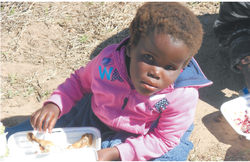
Palessa is a nine year old girl living in a village in Quthing district who was born with a severe physical disability. She suffers from sores on her back which render her unable to walk or stand up straight. Palessa must travel strapped to her mother’s back and as a result she cannot attend school.
When Palessa’s mother took her to seek medical help at Quthing Government Hospital, she was sent away without training and told to engage her child in physiotherapy exercises.
Palessa is unable to access a government provided wheelchair because she must be assessed by a doctor and so far her mother has been unable to find one who will see her.
Article 25 of the Convention on the Rights of the Persons with Disabilities provides that, state parties shall ensure that, people with disabilities enjoy the right to healthcare of the highest attainable standard without discrimination on the basis of disability. Unfortunately this right will never be a reality if cases such as Palessa’s are immediately thrown into the ‘too hard’ basket.
When Palessa’s mother took her to seek medical help at Quthing Government Hospital, she was sent away without training and told to engage her child in physiotherapy exercises.
Palessa is unable to access a government provided wheelchair because she must be assessed by a doctor and so far her mother has been unable to find one who will see her.
Article 25 of the Convention on the Rights of the Persons with Disabilities provides that, state parties shall ensure that, people with disabilities enjoy the right to healthcare of the highest attainable standard without discrimination on the basis of disability. Unfortunately this right will never be a reality if cases such as Palessa’s are immediately thrown into the ‘too hard’ basket.
Life After Blindness - Tlaak Ntsie
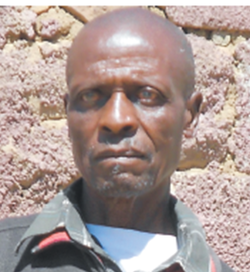
When Tlaak Ntsie lost his vision at the age of he thought his life was over. Tlaak worked as a shop assistant in Maseruand relied heavily on his sight.
Tlaak joined the Lesotho National League of Visually Impaired Persons (LNLVIP) where he met a number of others in his situation who helped him to realize that he could still live an independent and enjoyable life without sight. Through regular workshops on confidence and business management, LNLVIP helped him come to terms with his disability. He also learned orientation, mobility and other life skills and can now get around easily with his white cane.
To give himself financial independence Tlaal attended an intensive training course in candle making at the Mohloli oa Bophelo rehabilitation training centre, a vocational training centre operated by LNLVIP.
He now runs his own small business making candles, earning enough profit to support himself and his family.
Tlaak joined the Lesotho National League of Visually Impaired Persons (LNLVIP) where he met a number of others in his situation who helped him to realize that he could still live an independent and enjoyable life without sight. Through regular workshops on confidence and business management, LNLVIP helped him come to terms with his disability. He also learned orientation, mobility and other life skills and can now get around easily with his white cane.
To give himself financial independence Tlaal attended an intensive training course in candle making at the Mohloli oa Bophelo rehabilitation training centre, a vocational training centre operated by LNLVIP.
He now runs his own small business making candles, earning enough profit to support himself and his family.
Recovery from a Brutal Attack - Mamarama Moholi
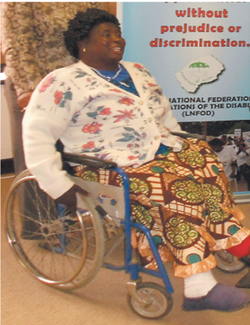
Mamarama Moholi is a middle aged wheelchair bound woman living in Motsekuoa, a village in the district of Mafateng. In March 1998 Mamarama was brutally attacked in her own home. The attacker broke through her door and forced his way into her house whilst she was lying alone in bed. He covered his face with a cloth and attacked her as she lay helpless. But Mamarama fought back.
When he realized that she would not allow him to take advantage of her despite her disability, the rapist pushed her into the burning fire on the primer stove. As a result Mamarama was severely burned and hospitalized for weeks. Mamarama reported the incident to the police who apprehended a suspect. On the day the case was scheduled to be heard, the investigating officer informed the Mamarama that the case had been postponed to unspecified date.
The reasons why Mamarama’s case has been postponed for more than ten years have yet to be explained by the magistrate, investigating officer and prosecutor.
Despite being denied closure and justice, Mamarama has managed to move on from her horrifying attack. Thanks to the David Foundation which provides shelter for people with disability, she now lives in a new, more secure house with her family and is trying to continue with her life, putting the incident in her past. She has even managed to recount her story at a training workshop for police so that other victims will not be placed in the same situation.
When he realized that she would not allow him to take advantage of her despite her disability, the rapist pushed her into the burning fire on the primer stove. As a result Mamarama was severely burned and hospitalized for weeks. Mamarama reported the incident to the police who apprehended a suspect. On the day the case was scheduled to be heard, the investigating officer informed the Mamarama that the case had been postponed to unspecified date.
The reasons why Mamarama’s case has been postponed for more than ten years have yet to be explained by the magistrate, investigating officer and prosecutor.
Despite being denied closure and justice, Mamarama has managed to move on from her horrifying attack. Thanks to the David Foundation which provides shelter for people with disability, she now lives in a new, more secure house with her family and is trying to continue with her life, putting the incident in her past. She has even managed to recount her story at a training workshop for police so that other victims will not be placed in the same situation.
Doing it By Myself - Mont'seng Mokhitli
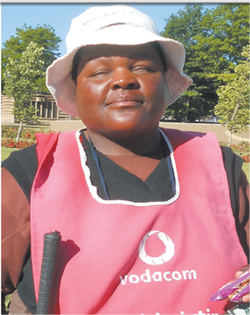
Mont’seng Mokhitli’s life fell apart when she lost her sight in 1995 at the age of 23. Her husband informally divorced her because of the belief she could no longer perform her duties as a wife. Abandoned by her husband, she was forced to return to her parental home along with her three children.
With no regular source of income and the welfare of her children to consider, Mont’seng enrolled at Mohloli oa Bophelo rehabilitation training centre as a way to boost her confidence and learn business skills.
She is now a strong and independent street vendor who sells air time and refreshments to passers-by on Kingsway, the main road in Maseru. This courageous woman believes that disability cannot stop you from making a living.
“At least I am doing something for myself - I am not a beggar, rather the breadwinner for my three children. Because of my disability, I face many challenges as a street vendor because customers can cheat me by deceiving me about the value of their notes. Basotho should stop regarding disability as illness, but rather as part of human diversity so tha they can buy my beautiful stuff.” comments Mont’seng.
With no regular source of income and the welfare of her children to consider, Mont’seng enrolled at Mohloli oa Bophelo rehabilitation training centre as a way to boost her confidence and learn business skills.
She is now a strong and independent street vendor who sells air time and refreshments to passers-by on Kingsway, the main road in Maseru. This courageous woman believes that disability cannot stop you from making a living.
“At least I am doing something for myself - I am not a beggar, rather the breadwinner for my three children. Because of my disability, I face many challenges as a street vendor because customers can cheat me by deceiving me about the value of their notes. Basotho should stop regarding disability as illness, but rather as part of human diversity so tha they can buy my beautiful stuff.” comments Mont’seng.
Don't Underestimate My Ability - Kelebone Ntsihlele
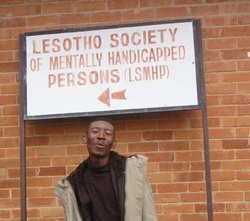
Kelebone was diagnosed with mental disability at a young age. Despite his disability, Kelebone is a highly engaged member of the community who contributes to society in many ways. Kelebone is 38 and shares a house with his mother and brother. He earns a living cutting trees and supplements his income by volunteering at Harvest Radio, a Christian radio station, and taking part in community projects, such as tree planting, when such opportunities become available.
Through his honesty and engaging personality he has earned the respect of several members of the community, including the local chief who regularly allows him to speak about disability issues at community meetings. He regularly attends church and has a wide network of friends who assist him with a range of tasks, such as managing his electricity usage. Every second Wednesday he joins the youth program run by the Lesotho Society of Mentally Handicapped Persons and DurhamLink, where he engages with other young people with mental disability.
Kelebone often acts as a protector for other young people with mental disability, and has intervened on a few occasions when he has heard of cases of abuse or maltreatment. He wishes to learn marketing and book keeping skills so that he may expand his tree cutting business and one day move into his own home. In his rare moments of spare time he likes helping his mother in the kitchen and garden.
Through his honesty and engaging personality he has earned the respect of several members of the community, including the local chief who regularly allows him to speak about disability issues at community meetings. He regularly attends church and has a wide network of friends who assist him with a range of tasks, such as managing his electricity usage. Every second Wednesday he joins the youth program run by the Lesotho Society of Mentally Handicapped Persons and DurhamLink, where he engages with other young people with mental disability.
Kelebone often acts as a protector for other young people with mental disability, and has intervened on a few occasions when he has heard of cases of abuse or maltreatment. He wishes to learn marketing and book keeping skills so that he may expand his tree cutting business and one day move into his own home. In his rare moments of spare time he likes helping his mother in the kitchen and garden.